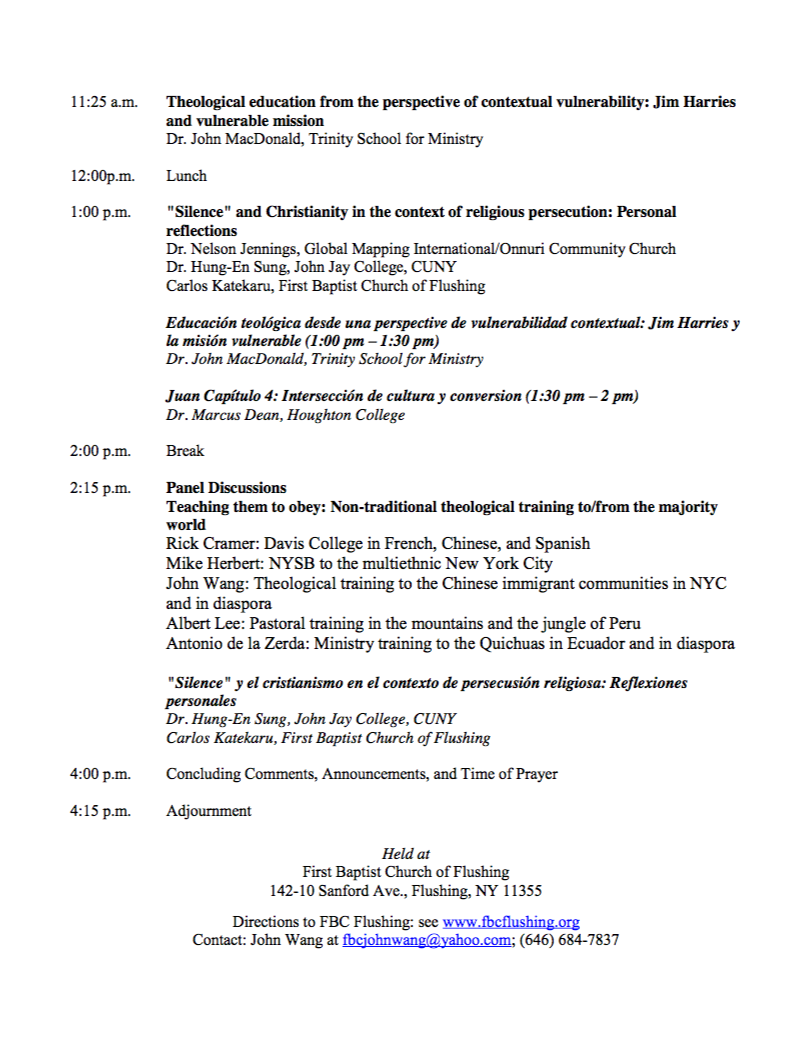Explorations in Ecumenism, Missions and Pentecostalism
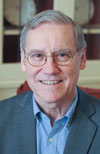 Dr. Jonathan Bonk, CGCM faculty associate, recently published a book chapter entitled "'And They Marveled.' Mammon as Miracle in Western Missionary Encounters" in A Light to the Nations: Explorations in Ecumenism, Missions and Pentecostalism, edited by Stanley M. Burgess and Paul W. Lewis. Dr. Bonk also chaired the meeting of the board of the Global Mission Leadership Forum in New Haven on February 20. The Forum will be held in Sokcho, South Korea, from November 7-11 on the theme "Migration, Human Dislocation, and Accountability in Mission." This will be the fourth biennial conference in the series, each of which has generated a book in Korean and in English.
Dr. Jonathan Bonk, CGCM faculty associate, recently published a book chapter entitled "'And They Marveled.' Mammon as Miracle in Western Missionary Encounters" in A Light to the Nations: Explorations in Ecumenism, Missions and Pentecostalism, edited by Stanley M. Burgess and Paul W. Lewis. Dr. Bonk also chaired the meeting of the board of the Global Mission Leadership Forum in New Haven on February 20. The Forum will be held in Sokcho, South Korea, from November 7-11 on the theme "Migration, Human Dislocation, and Accountability in Mission." This will be the fourth biennial conference in the series, each of which has generated a book in Korean and in English.
GRACE Anglican Church in Joondalup
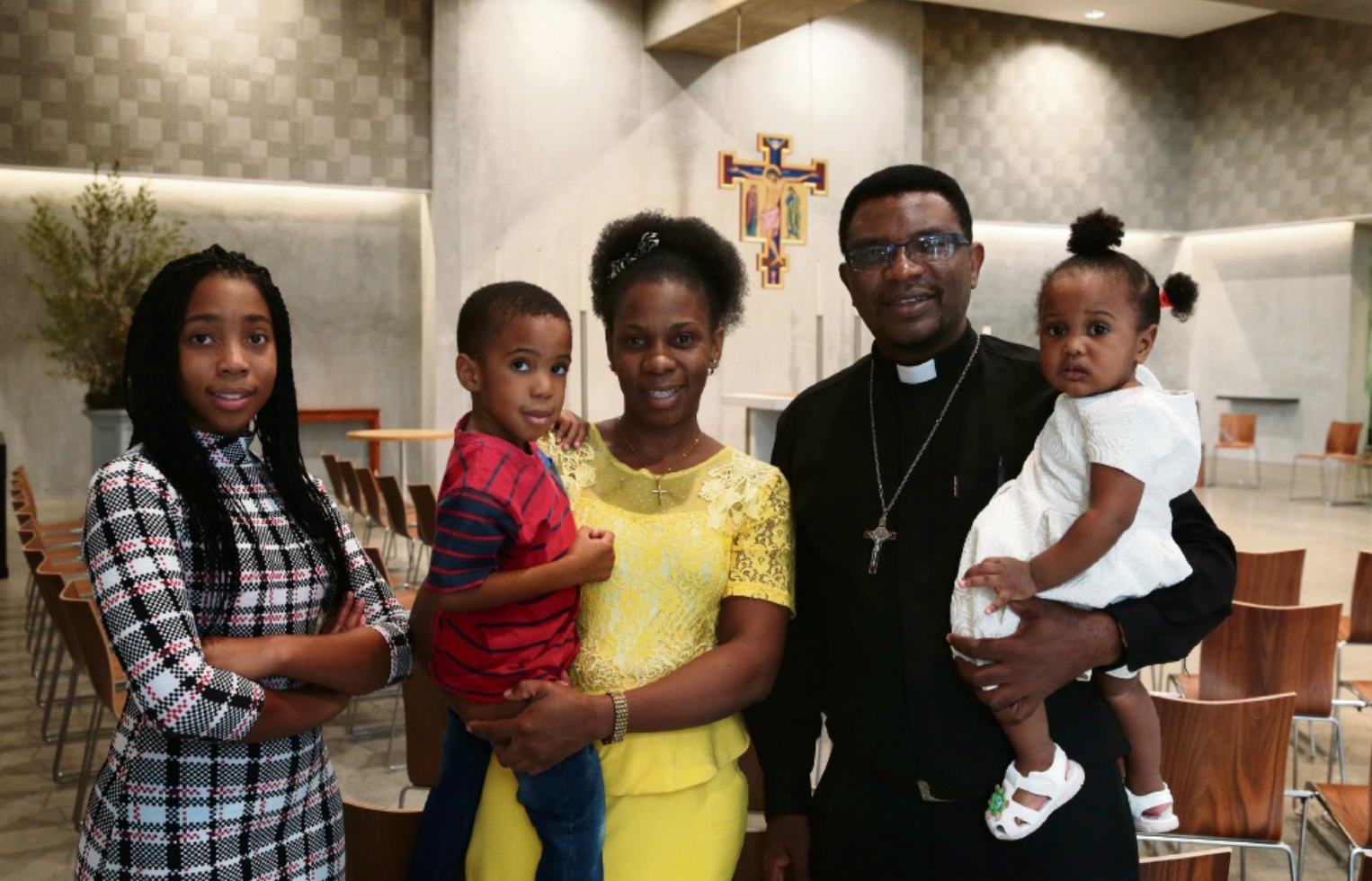 Dr. Gift Makwasha, Boston University School of Theology alumnus, was commissioned as the first full-time priest for GRACE Anglican Church in Joondalup. Dr. Makwasha moved to Perth from Zimbabwe with his family in late February to take up the position. The parish held a commissioning service on March 16 to welcome Dr. Makwasha, performed by Assistant Bishop of Perth Jeremy James. Full article can be found here.
Dr. Gift Makwasha, Boston University School of Theology alumnus, was commissioned as the first full-time priest for GRACE Anglican Church in Joondalup. Dr. Makwasha moved to Perth from Zimbabwe with his family in late February to take up the position. The parish held a commissioning service on March 16 to welcome Dr. Makwasha, performed by Assistant Bishop of Perth Jeremy James. Full article can be found here.
Religious Influences on Political Engagement
"Religious Influences on Political Engagement: Insights from Sub-Saharan Africa"
Wednesday, March 22, 12pm in the African Studies seminar room (232 Bay State Rd., room 505)
Gwyneth McClendon of Harvard will present "Religious Influences on Political Engagement: Insights from Sub-Saharan Africa" in the Research in Comparative Politics workshop. The presentation is based on a book manuscript co-authored with Rachel Riedl of Northwestern. Lunch served.
For questions, contact:
Gwyneth McClendon
Harvard University
gmcclendon@gov.harvard.edu
Rachel Beatty Riedl
Northwestern University
r-riedl@northwestern.edu
The Saints of Santa Ana: Ethnic Membership and Religious Identities in the Barrio
 Dr. Jonathan Calvillo, CGCM faculty associate, has been awarded Louisville Institute's First Book Grant for Minority Scholars. The title of his project is "The Saints of Santa Ana: Ethnic Membership and Religious Identities in the Barrio." This project examines the influence of religious identities on the ethnic community membership of Mexican immigrants in the U.S. The intersection of Latino ethnicity and religion presents a timely topic given that significant segments of the Latino population have shifted from Catholic to Evangelical adherence. These shifts in religious affiliation are particularly pronounced in Santa Ana, CA, the research site for this project. Santa Ana is a densely populated city of 330,000 residents with a majority population of Latino origin. The city's religious landscape has become increasingly diverse. I argue that the social boundaries tied to differing religiosities result in diverging and reconfigured ethnic identity projects. Catholics and Evangelicals both make claims to authentic ethnic identities, but they live out their ethnicity in notably different ways. Three key spheres of contestation emerge between Catholic and Evangelical conceptualizations of ethnic membership: The modes of actualizing membership in the ethnic enclave, the discursive strategies of ethnic self-identification, and the dynamics of ethnic authenticity policing. This project speaks to the role of faith communities in providing modes of societal membership for immigrants. Beyond the religious sphere, this project carries broad implications for understanding Latino experiences of assimilation, civic engagement, and racialization.
Dr. Jonathan Calvillo, CGCM faculty associate, has been awarded Louisville Institute's First Book Grant for Minority Scholars. The title of his project is "The Saints of Santa Ana: Ethnic Membership and Religious Identities in the Barrio." This project examines the influence of religious identities on the ethnic community membership of Mexican immigrants in the U.S. The intersection of Latino ethnicity and religion presents a timely topic given that significant segments of the Latino population have shifted from Catholic to Evangelical adherence. These shifts in religious affiliation are particularly pronounced in Santa Ana, CA, the research site for this project. Santa Ana is a densely populated city of 330,000 residents with a majority population of Latino origin. The city's religious landscape has become increasingly diverse. I argue that the social boundaries tied to differing religiosities result in diverging and reconfigured ethnic identity projects. Catholics and Evangelicals both make claims to authentic ethnic identities, but they live out their ethnicity in notably different ways. Three key spheres of contestation emerge between Catholic and Evangelical conceptualizations of ethnic membership: The modes of actualizing membership in the ethnic enclave, the discursive strategies of ethnic self-identification, and the dynamics of ethnic authenticity policing. This project speaks to the role of faith communities in providing modes of societal membership for immigrants. Beyond the religious sphere, this project carries broad implications for understanding Latino experiences of assimilation, civic engagement, and racialization.Religion’s Imperial Pasts, Global Futures
“Religion’s Imperial Pasts, Global Futures.”
David Chidester, professor of religious studies and director of the Institute for Comparative Religion in Southern Africa at the University of Cape Town, will give a a public lecture on March 29, 2017.
When: Wednesday, March 29, 4:30-6:30
Where: Alumnae Lounge (40 Talbot Avenue, Medford, MA)
Christianity, Modernity, and Fireworks in Meiji and Taisho Japan
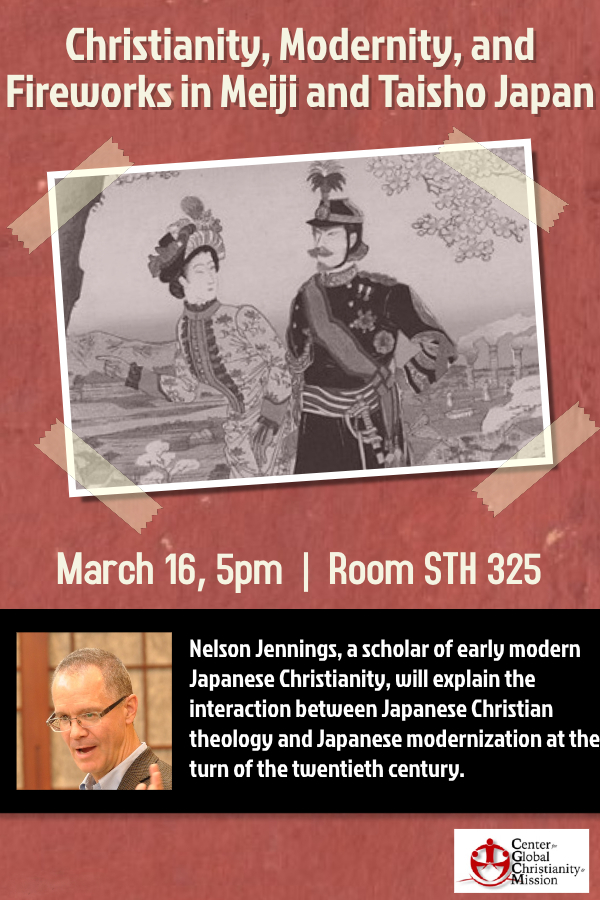
Race, Immigration, Ethnicity, and Religion in America
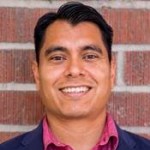 Dr. Jonathan Calvillo, CGCM faculty associate, and Dr. Russell Jeung recently published an article entitled "Race, Immigration, Ethnicity, and Religion in America." This is an encyclopedia entry within the Oxford Research Encyclopedia series featured in their volume on Sociology, Anthropology, and Psychology of Religion. Their article first provide an overview of the ethnic, racial, and religious demographic changes in the past decade, followed by a review of three ways in which immigration has altered America’s religious landscape. Second, Calvillo and Jeung examine how transnational ties enable immigrants to sustain their traditions and make religious innovations. Third, they consider the intersection of ethnicity and religion, and how groups have related these two key, socially constructed groupings. Finally, the authors consider how race in the United States continues to structure religious formations.
Dr. Jonathan Calvillo, CGCM faculty associate, and Dr. Russell Jeung recently published an article entitled "Race, Immigration, Ethnicity, and Religion in America." This is an encyclopedia entry within the Oxford Research Encyclopedia series featured in their volume on Sociology, Anthropology, and Psychology of Religion. Their article first provide an overview of the ethnic, racial, and religious demographic changes in the past decade, followed by a review of three ways in which immigration has altered America’s religious landscape. Second, Calvillo and Jeung examine how transnational ties enable immigrants to sustain their traditions and make religious innovations. Third, they consider the intersection of ethnicity and religion, and how groups have related these two key, socially constructed groupings. Finally, the authors consider how race in the United States continues to structure religious formations.
Christianity, Development and Modernity in Africa

Migration, Exile, and Pilgrimage in the History of Missions and World Christianity
Paper proposals should be submitted to me (martha.smalley@yale.edu) via email attachment by March 5, 2017 and should include your name, institutional affiliation and status, the title of your proposed paper, and a one paragraph summary. Papers should relate in some way to the conference theme: Migration, Exile, and Pilgrimage in the History of Missions and World Christianity. Notification of successful proposals will be made by March 15, 2017.
See more information about the meeting and a link to the pre-registration and accommodations request form at http://divinity-adhoc.library.
Engaging Theology, Theologians, and Theological Education in/from Majority World Contexts
The Evangelical Missiological Society, Northeast Regional Conference will be held Saturday, March 18th. The schedule is below. In order to register, please visit the EMS Homepage.

